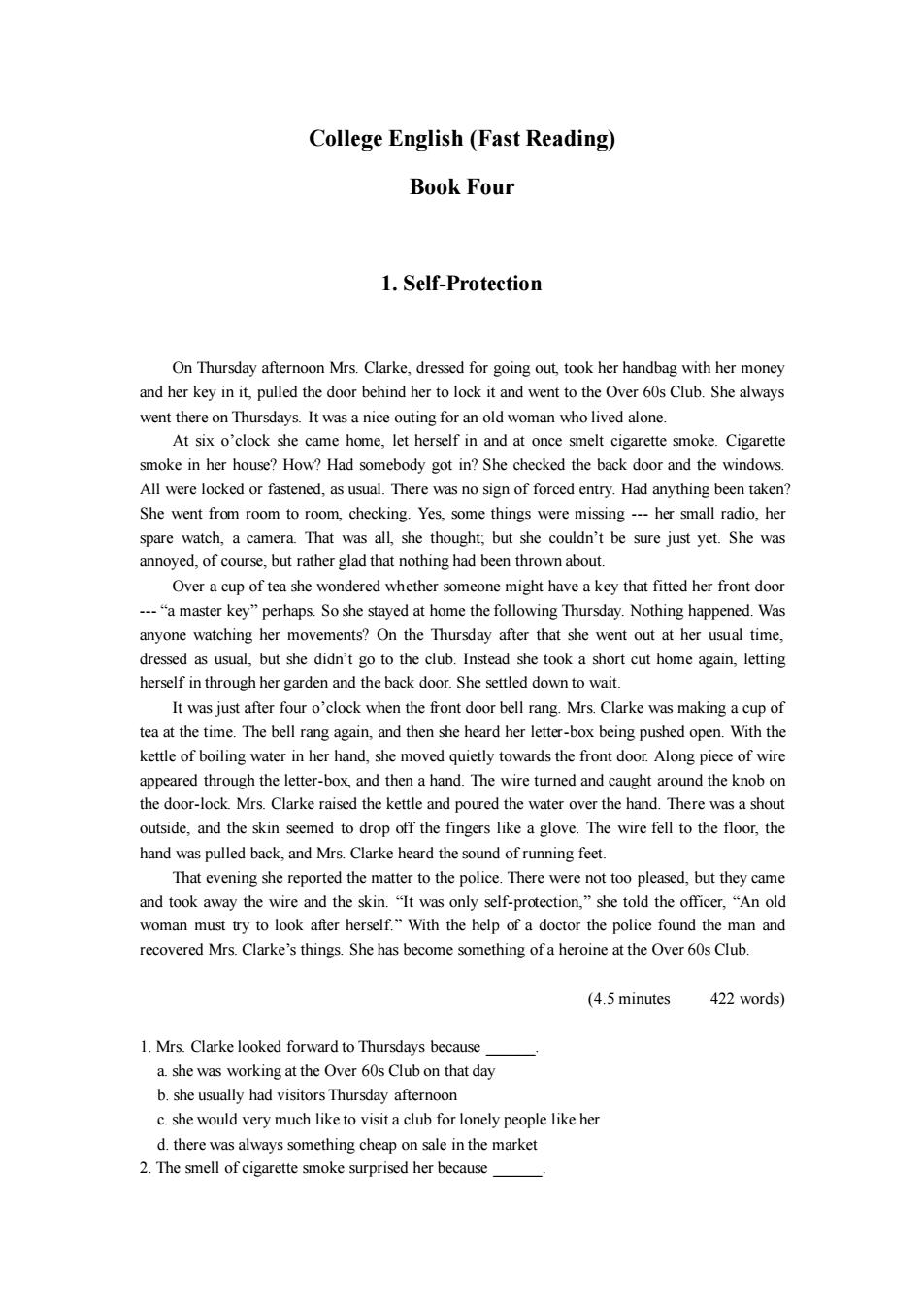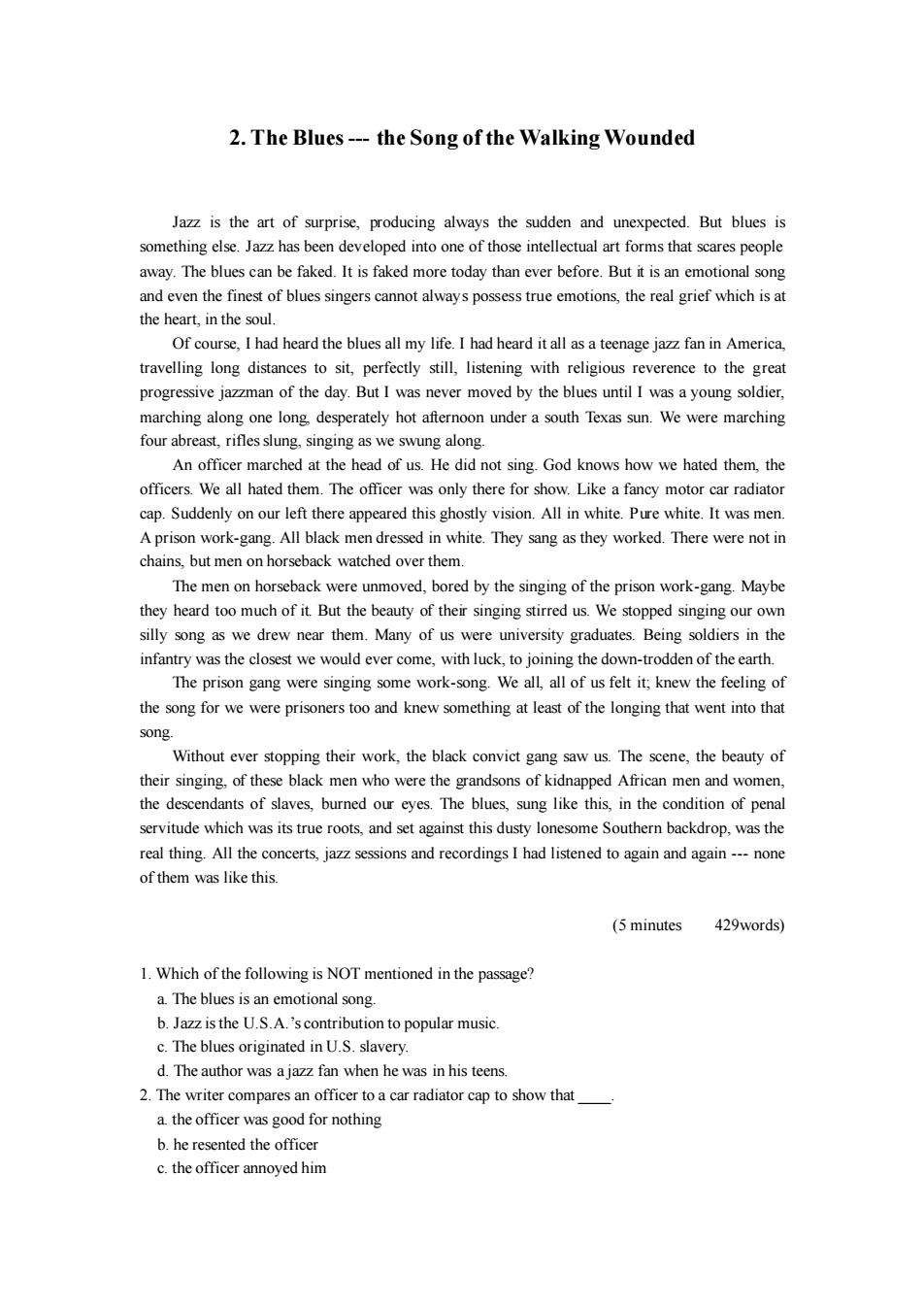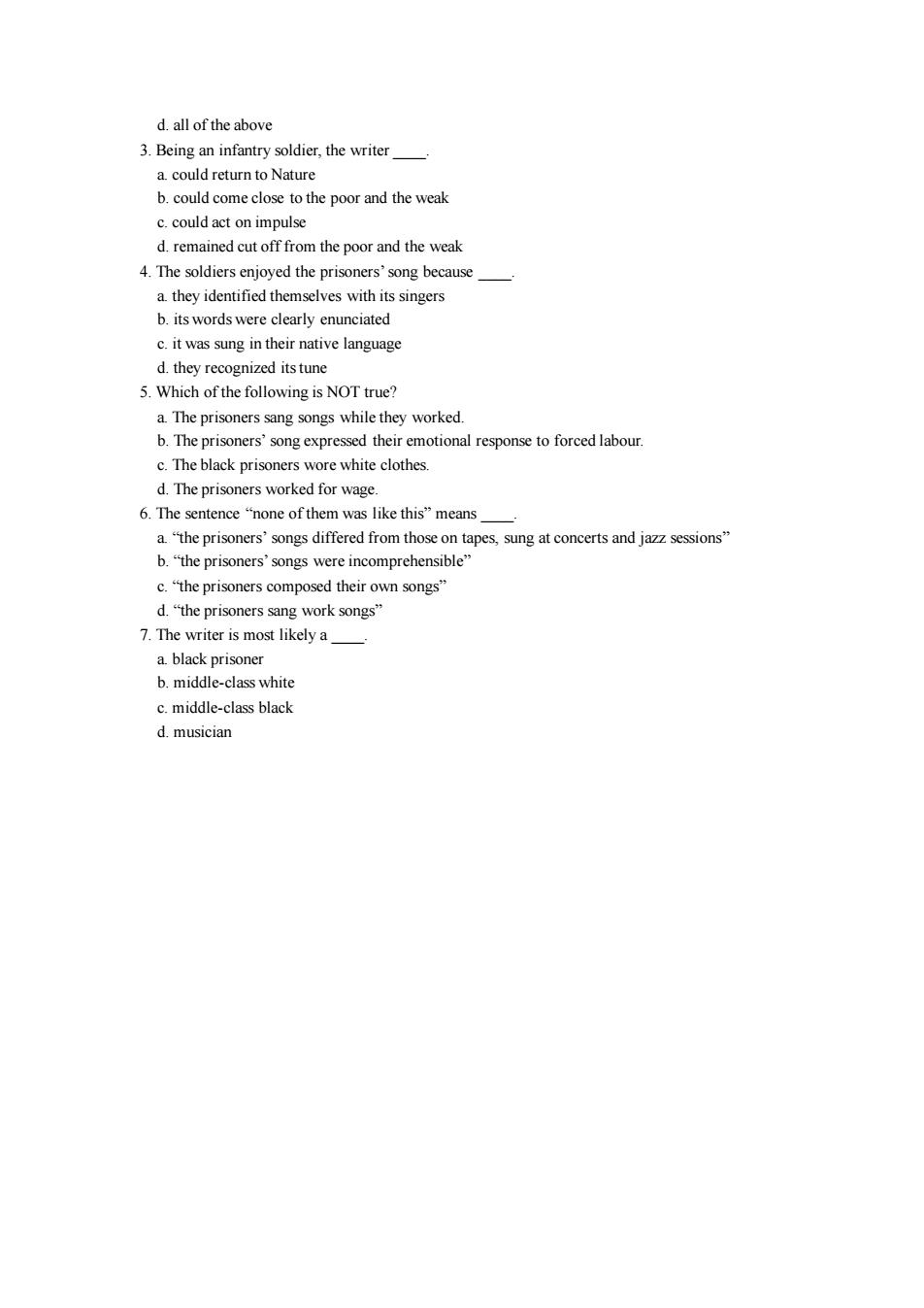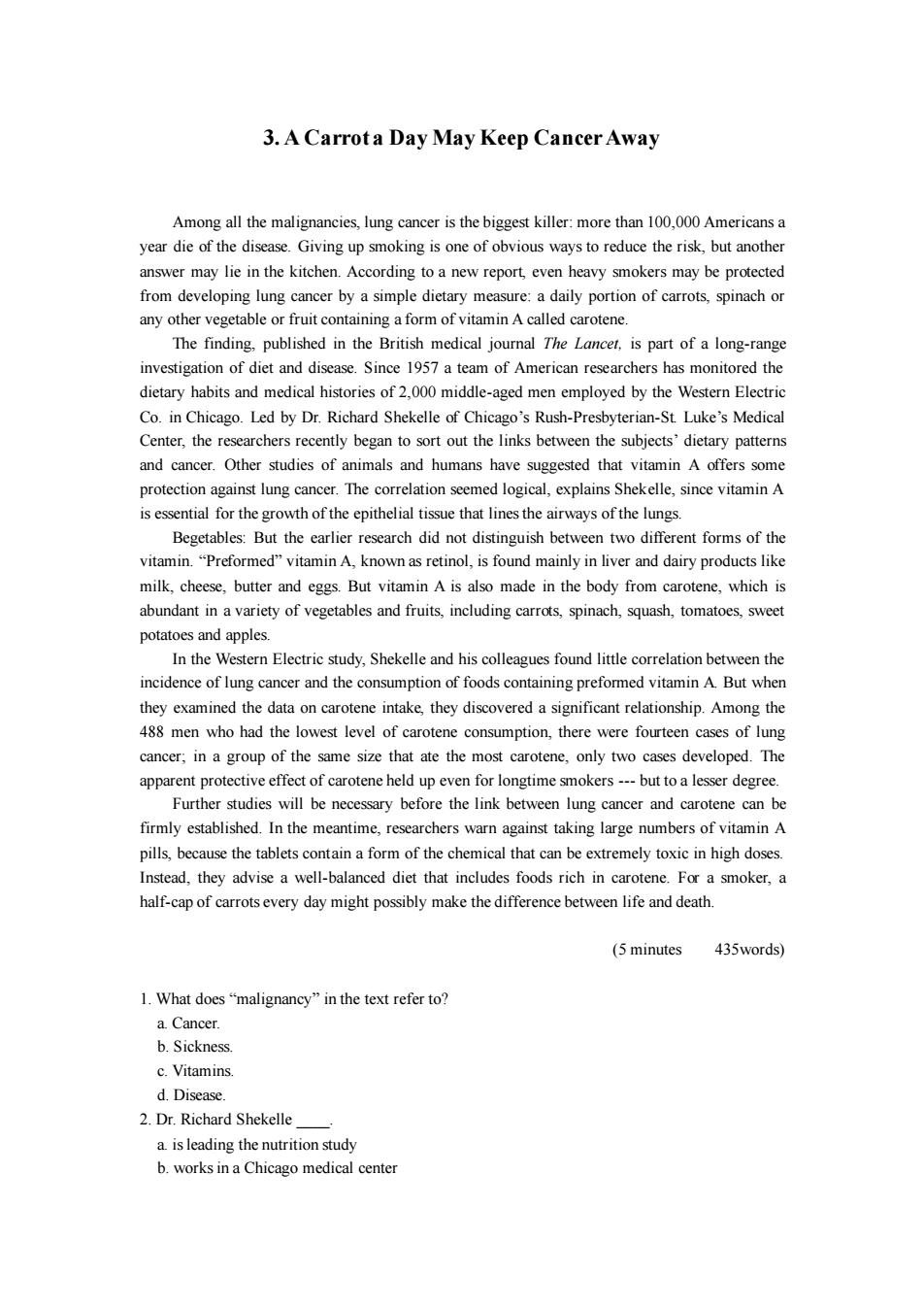
College English (Fast Reading) Book Four 1.Self-Protection On Thursday afternoon Mrs.Clarke,dressed for going out,took her handbag with her money and her key in it.pulled the door behind her to lock it and went to the Over 60s Club.She always went dyslrwasanioeoutingfocanoldwomanwholvedadons At six o'clock she came home,let herself in and at once smelt cigarette smoke.Cigarette smoke in her house?How?Had somebody got in?She checked the back door and the windows. All were locked or fastened,as usual.There was no sign of forced entry.Had anything been taken? She went from room to room.checking.Yes.some things were missing---her small radio.her spare watch,a camera That was all she thought,but she couln't be sure just yet.She was but rather glad that n th wn abou Over a cup of tea she wondered whether someone might have a key that fitted her front door ---"a master key"perhaps.So she stayed at home the following Thursday.Nothing happened.Was anyone watching her movements?On the Thursday after that she went out at her usual time, dressed as usual,but she didn't go to the club.Instead she took a short cut home again,letting herself in through her the back oor.She It was just after four o'clock when the front door bell rang.Mrs.Clarke was making a cup of tea at the time.The bell rang again,and then she heard her letter-box being pushed open.With the kettle of boiling water in her hand,she moved quietly towards the front door.Along piece of wire was a shout outside,and the skin smed to drop off the fingers likea glove. The wire fell to the floor.the hand was pulled back,and Mrs.Clarke heard the sound of running feet. That evening she reported the matter to the police.There were not too pleased,but they came and took away the wire and the skin."It was only self-protection."she told the officer."An old woman must try to look after herself."With the help of a doctor the police found the man and recovered Mrs.Clarke's things.She has become something ofa heroine at the Over60s Club. (4.5 minutes 422 vords】 1.Mrs.Clarke looked forward to Thursdays because a.she was working at the Over 60s Clubon that day c.she would very much like to visit a club for lonely people like her d.there was always something cheap on sale in the market 2.The smell of cigarette smoke surprised her because
College English (Fast Reading) Book Four 1. Self-Protection On Thursday afternoon Mrs. Clarke, dressed for going out, took her handbag with her money and her key in it, pulled the door behind her to lock it and went to the Over 60s Club. She always went there on Thursdays. It was a nice outing for an old woman who lived alone. At six o’clock she came home, let herself in and at once smelt cigarette smoke. Cigarette smoke in her house? How? Had somebody got in? She checked the back door and the windows. All were locked or fastened, as usual. There was no sign of forced entry. Had anything been taken? She went from room to room, checking. Yes, some things were missing --- her small radio, her spare watch, a camera. That was all, she thought; but she couldn’t be sure just yet. She was annoyed, of course, but rather glad that nothing had been thrown about. Over a cup of tea she wondered whether someone might have a key that fitted her front door --- “a master key” perhaps. So she stayed at home the following Thursday. Nothing happened. Was anyone watching her movements? On the Thursday after that she went out at her usual time, dressed as usual, but she didn’t go to the club. Instead she took a short cut home again, letting herself in through her garden and the back door. She settled down to wait. It was just after four o’clock when the front door bell rang. Mrs. Clarke was making a cup of tea at the time. The bell rang again, and then she heard her letter-box being pushed open. With the kettle of boiling water in her hand, she moved quietly towards the front door. Along piece of wire appeared through the letter-box, and then a hand. The wire turned and caught around the knob on the door-lock. Mrs. Clarke raised the kettle and poured the water over the hand. There was a shout outside, and the skin seemed to drop off the fingers like a glove. The wire fell to the floor, the hand was pulled back, and Mrs. Clarke heard the sound of running feet. That evening she reported the matter to the police. There were not too pleased, but they came and took away the wire and the skin. “It was only self-protection,” she told the officer, “An old woman must try to look after herself.” With the help of a doctor the police found the man and recovered Mrs. Clarke’s things. She has become something of a heroine at the Over 60s Club. (4.5 minutes 422 words) 1. Mrs. Clarke looked forward to Thursdays because ______. a. she was working at the Over 60s Club on that day b. she usually had visitors Thursday afternoon c. she would very much like to visit a club for lonely people like her d. there was always something cheap on sale in the market 2. The smell of cigarette smoke surprised her because ______

a she had not taken her cigarettes with her that dav b.she remembered not having lefa cigarette buning c.she never smo ked herself d.she could not bear anyone smoking in her house 3.On the third Thursday Mrs.Clarke went out at her usual time a because she didn't want to miss the club again b.tose if the thief was hanging .to the forgetting about that thef d.in an attempt to trick the thief 4.The lock on the front door was one which a.needed a piece of wire to open it b.could be opened from inside without a key .coun'be opened without a key d.used a knob instead of a key 5.The thief was arrested and Mrs.Clarke's things recovered after a he went to have his hand treated as a clinic b.the police found his fingerprintson the wire he co pained tothe policeabou upon him gave the policeadetailed thef 6.Which of the following is true? a.Every Thursday afternoon Mrs.Clarke went to a club for lonely people. b.Mrs.Clarke strongly believed that a small radio.a watch and a camera were all the things she lost in the theft. d.Theold lady used a glove of man-made skin as a weapon for self-protection
a. she had not taken her cigarettes with her that day b. she remembered not having left a cigarette burning c. she never smoked herself d. she could not bear anyone smoking in her house 3. On the third Thursday Mrs. Clarke went out at her usual time ______. a. because she didn’t want to miss the club again b. to see if the thief was hanging about outside c. to the club, entirely forgetting about that unpleasant theft d. in an attempt to trick the thief 4. The lock on the front door was one which ______. a. needed a piece of wire to open it b. could be opened from inside without a key c. couldn’t be opened without a key d. used a knob instead of a key 5. The thief was arrested and Mrs. Clarke’s things recovered after _____. a. he went to have his hand treated as a clinic b. the police found his fingerprints on the wire c. he complained to the police about the wound inflicted upon him d. the old lady gave the police a detailed description of the thief 6. Which of the following is true? a. Every Thursday afternoon Mrs. Clarke went to a club for lonely people. b. Mrs. Clarke strongly believed that a small radio, a watch and a camera were all the things she lost in the theft. c. On the third Thursday, Mrs. Clark went out and then returned home by taking another route. d. The old lady used a glove of man-made skin as a weapon for self-protection

2.The Blues---the Song of the Walking Wounded Jazz is the art of surprise.producing always the sudden and unexpected.But blues is something else.Jazz has been developed into one of those intellectual art forms that scares people cbe faked.tsare tody tha verbeforeu of blues singers cannot always possess true emotions,the real grief which isa the heart,in the ou Of course,I had heard the blues all my life.I had heard it all as a teenage jazz fan in America. travelling long distances to sit,perfectly still,listening with religious reverence to the great progressive jazzman of the day.But I was never moved by the blues until I was a young soldier. marching l one long desperately hot under a south Texas sun We were marching four abreast.rifess ung,singing as we swung along. An officer marched at the head of us.He did not sing.God knows how we hated them,the officers.We all hated them.The officer was only there for show.Like a fancy motor car radiator cap.Suddenly on our left there appeared this ghostly vision.All in white.Pure white.It was men. dressed in white.They sang as they worked.There were not in horseback watched over The men on horseback were unmoved,bored by the singing of the prison work-gang.Maybe they heard too much of it But the beauty of their singing stirred us.We stopped singing our own silly song as we drew near them.Many of us were university graduates.Being soldiers in the infantry was the closest we would ever come.with luck.to joining the down-trodden of the earth. The prison gang were inging sor ork-son ll all of us felt it knew the feel ng the song for we were prisoners too and knew something at least of the longing that went into tha song. Without ever stopping their work,the black convict gang saw us.The scene,the beauty of their singing.of these black men who were the grandsons of kidnapped African men and women the des ndants of slaves,bured o eyes The blues,sung like this,in the condition of penal servitude hich was this backdrop.was the real thing.All the concerts,jazz sessions and recordings I had listened to again and again --none of them was like this. (5 minutes 429words) 1.Which of the following is NOT mentioned in the passage a.The blues is an emotional song. b.Jazz is the U.S.A.'s contribution to popular music c.The blues originated in U.S.slavery d.The author wasaja fan when he was in his teens 2.The writer compares an officer to a car radiator cap to show that a.the officer was good for nothing b.he resented the officer c.the officer annoyed him
2. The Blues --- the Song of the Walking Wounded Jazz is the art of surprise, producing always the sudden and unexpected. But blues is something else. Jazz has been developed into one of those intellectual art forms that scares people away. The blues can be faked. It is faked more today than ever before. But it is an emotional song and even the finest of blues singers cannot always possess true emotions, the real grief which is at the heart, in the soul. Of course, I had heard the blues all my life. I had heard it all as a teenage jazz fan in America, travelling long distances to sit, perfectly still, listening with religious reverence to the great progressive jazzman of the day. But I was never moved by the blues until I was a young soldier, marching along one long, desperately hot afternoon under a south Texas sun. We were marching four abreast, rifles slung, singing as we swung along. An officer marched at the head of us. He did not sing. God knows how we hated them, the officers. We all hated them. The officer was only there for show. Like a fancy motor car radiator cap. Suddenly on our left there appeared this ghostly vision. All in white. Pure white. It was men. A prison work-gang. All black men dressed in white. They sang as they worked. There were not in chains, but men on horseback watched over them. The men on horseback were unmoved, bored by the singing of the prison work-gang. Maybe they heard too much of it. But the beauty of their singing stirred us. We stopped singing our own silly song as we drew near them. Many of us were university graduates. Being soldiers in the infantry was the closest we would ever come, with luck, to joining the down-trodden of the earth. The prison gang were singing some work-song. We all, all of us felt it; knew the feeling of the song for we were prisoners too and knew something at least of the longing that went into that song. Without ever stopping their work, the black convict gang saw us. The scene, the beauty of their singing, of these black men who were the grandsons of kidnapped African men and women, the descendants of slaves, burned our eyes. The blues, sung like this, in the condition of penal servitude which was its true roots, and set against this dusty lonesome Southern backdrop, was the real thing. All the concerts, jazz sessions and recordings I had listened to again and again --- none of them was like this. (5 minutes 429words) 1. Which of the following is NOT mentioned in the passage? a. The blues is an emotional song. b. Jazz is the U.S.A.’s contribution to popular music. c. The blues originated in U.S. slavery. d. The author was a jazz fan when he was in his teens. 2. The writer compares an officer to a car radiator cap to show that ____. a. the officer was good for nothing b. he resented the officer c. the officer annoyed him

d.all of the above a.could return to Nature b.could come close to the poor and the weak c.could act on impulse d.remained cut off from the poor and the weak a.they identified themselves with its singers b.its words were clearly enunciated c.it was sung in their native language d.they recognized its tune 5.Which of the following is NOT true? b.The prisoners'song expressed their emotional response to forced labou c.The black prisoners wore white clothes d.The prisoners worked for wage 6.The sentence"none of them was like this"mean b."the prisoners'songs were incomprehensible c."the prisoners composed their own songs d."the prisoners sang work songs" 7.The writer is most likely a & swhit c.middle-class black d.musician
d. all of the above 3. Being an infantry soldier, the writer ____. a. could return to Nature b. could come close to the poor and the weak c. could act on impulse d. remained cut off from the poor and the weak 4. The soldiers enjoyed the prisoners’song because ____. a. they identified themselves with its singers b. its words were clearly enunciated c. it was sung in their native language d. they recognized its tune 5. Which of the following is NOT true? a. The prisoners sang songs while they worked. b. The prisoners’ song expressed their emotional response to forced labour. c. The black prisoners wore white clothes. d. The prisoners worked for wage. 6. The sentence “none of them was like this” means ____. a. “the prisoners’ songs differed from those on tapes, sung at concerts and jazz sessions” b. “the prisoners’songs were incomprehensible” c. “the prisoners composed their own songs” d. “the prisoners sang work songs” 7. The writer is most likely a ____. a. black prisoner b. middle-class white c. middle-class black d. musician

3.A Carrota Day May Keep Cancer Away Among all the malignancies.lung cancer is the biggest killer:more than 100.000 Americans a year die of the disease.Giving up smoking is one of obvious ways to reduce the risk,but another answer may lie in the kitchen.According toa new report even heavy smokers may be proected from developing lung cancer by a simple dietary me re:a daily portion inach o any other vegetable or fruit ofvitamin A called carotene. The finding,published in the British medical journal The Lancet.is part of a long-range investigation of diet and disease.Since 1957a team of American researchers has monitored the dietary habits and medical histories of 2.000 middle-aged men emploved by the Western Electric o.in Chicago.Led by Dr.Richard Shekelle f Chie o's Rush-Presbyte ian-St Luke's Medical Center,the researchers recently began to sor out the links between the subjects' di tary patterns and cancer.Other studies of animals and humans have suggested that vitamin A offers some protection against lung cancer.The correlation seemed logical,explains Shekelle,since vitamin A is essential for the growth of the epithelial tissue that lines the airways of the lungs. Begetables But the earlier research did not distinguish betv een two different forms of the vitamin ed" amin A. l is four m ly in liver rand dairy pro s like milk,cheese,butter and eggs.But vitamin A is also made in the body from carotene,which is abundant in a variety of vegetables and fruits,including carrots,spinach,squash,tomatoes,sweet potatoes and apples. In the Western Electric study,Shekelle and his colleagues found little correlation between the nci ence of lung erand the of foods c n A.But wher they examined the data on carotene intake,they discovered a significant relationship.Among the 488 men who had the lowest level of carotene consumption.there were fourteen cases of lung cancer;in a group of the same size that ate the most carotene,only two cases developed.The apparent protective effect of carotene held up even for longtime smokersbuttordegree. Further studies will be nece sary before the link bet ween lung cancer and carotene can b firmly established.In the meantime.researchers warn against taking large numbers of vitaminA pills,because the tablets contain a form of the chemical that can be extremely toxic in high doses Instead,they advise a well-balanced diet that includes foods rich in carotene.For a smoker,a half-cap of carrots every day might possibly make the difference between life and death. (5 minutes 435words) 1.What does"malignancy"in the text refer to? a.Cancer. h Sickness c.Vitamins d Diseas 2.Dr.Richard Shekelle a.is leading the nutrition study b.works in a Chicago medical center
3. A Carrot a Day May Keep Cancer Away Among all the malignancies, lung cancer is the biggest killer: more than 100,000 Americans a year die of the disease. Giving up smoking is one of obvious ways to reduce the risk, but another answer may lie in the kitchen. According to a new report, even heavy smokers may be protected from developing lung cancer by a simple dietary measure: a daily portion of carrots, spinach or any other vegetable or fruit containing a form of vitamin A called carotene. The finding, published in the British medical journal The Lancet, is part of a long-range investigation of diet and disease. Since 1957 a team of American researchers has monitored the dietary habits and medical histories of 2,000 middle-aged men employed by the Western Electric Co. in Chicago. Led by Dr. Richard Shekelle of Chicago’s Rush-Presbyterian-St. Luke’s Medical Center, the researchers recently began to sort out the links between the subjects’ dietary patterns and cancer. Other studies of animals and humans have suggested that vitamin A offers some protection against lung cancer. The correlation seemed logical, explains Shekelle, since vitamin A is essential for the growth of the epithelial tissue that lines the airways of the lungs. Begetables: But the earlier research did not distinguish between two different forms of the vitamin. “Preformed” vitamin A, known as retinol, is found mainly in liver and dairy products like milk, cheese, butter and eggs. But vitamin A is also made in the body from carotene, which is abundant in a variety of vegetables and fruits, including carrots, spinach, squash, tomatoes, sweet potatoes and apples. In the Western Electric study, Shekelle and his colleagues found little correlation between the incidence of lung cancer and the consumption of foods containing preformed vitamin A. But when they examined the data on carotene intake, they discovered a significant relationship. Among the 488 men who had the lowest level of carotene consumption, there were fourteen cases of lung cancer; in a group of the same size that ate the most carotene, only two cases developed. The apparent protective effect of carotene held up even for longtime smokers --- but to a lesser degree. Further studies will be necessary before the link between lung cancer and carotene can be firmly established. In the meantime, researchers warn against taking large numbers of vitamin A pills, because the tablets contain a form of the chemical that can be extremely toxic in high doses. Instead, they advise a well-balanced diet that includes foods rich in carotene. For a smoker, a half-cap of carrots every day might possibly make the difference between life and death. (5 minutes 435words) 1. What does “malignancy” in the text refer to? a. Cancer. b. Sickness. c. Vitamins. d. Disease. 2. Dr. Richard Shekelle ____. a. is leading the nutrition study b. works in a Chicago medical center